-
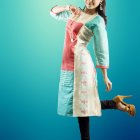 Kurtis are Lifesavers for a Busy Schedule and Well Worth the Effort of Keeping Them Up to Date: 10 of the Latest Kurti Patterns for 2019 and Tips to Style Them
Kurtis are Lifesavers for a Busy Schedule and Well Worth the Effort of Keeping Them Up to Date: 10 of the Latest Kurti Patterns for 2019 and Tips to Style Them
-
 Best Polo Shirts for Men in India and Tips on How to Make These Smart Casual Shirts Work for You (2019)
Best Polo Shirts for Men in India and Tips on How to Make These Smart Casual Shirts Work for You (2019)
-
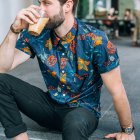 10 Fabulous Men's Printed Shirts That Give You Plenty of Reasons to Work Prints All Season and Not Just on Vacation (2020)
10 Fabulous Men's Printed Shirts That Give You Plenty of Reasons to Work Prints All Season and Not Just on Vacation (2020)
Sustainable Fashion is the New Black
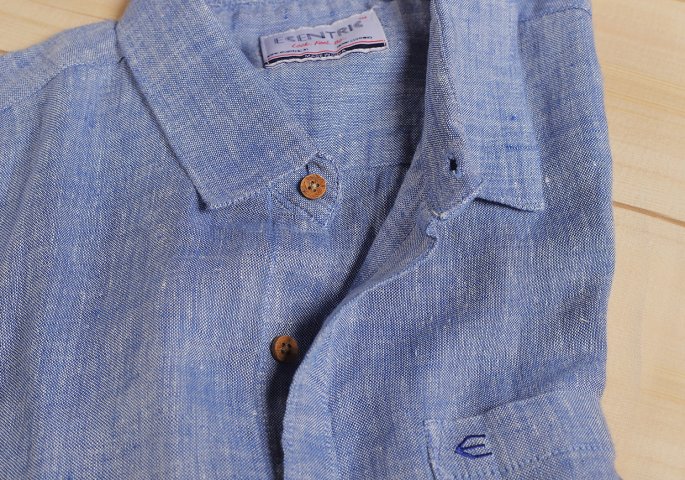
With global temperatures soaring over the past few years, countries all around the world have been forced to seriously consider the impact of global warming and act on it. In sync with that, companies across industries, starting from the omnipresent IT sector to the youngest businesses have been forced to redesign their approach towards sustainability. The second most polluting industry in the world, the textile industry, is not far behind in this rat race of credibility and authenticity. But what exactly is sustainability?
Sustainability, in simple terms, is about meeting your own needs and goals without compromising the needs of the future generation. In other words, using a resource in a way that it lasts. Technological advancements and wide access has led to consumers becoming more aware and sensitive to the lifecycle of their products and brand practices. Today, the three pillars of sustainability: profit, people and earth have gained paramount importance in business strategies, preserving and cultivating which has become a top priority for most fashion brands. And yet, there is a flaw. Despite vigorous changes having been introduced in the form of practices like eco-friendly production practices and sustainable products, the Indian fashion industry fails to do it at a reasonable rate, leaving out a wide chunk of the population. This is where Ecentric comes into the picture.
Ecentric's Remarkable Efforts for Creating Sustainable Yet Affordable Fashion
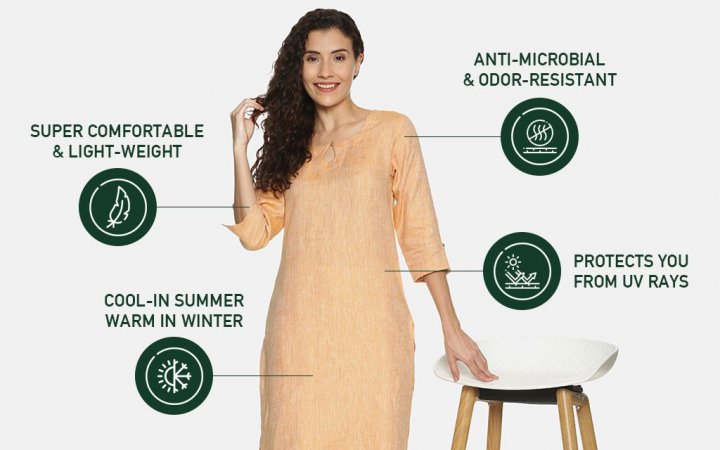
Established in 2020, Ecentric seeks to make sustainable products affordable. Its founder, Mr. Salendra Gupta, traces the inspiration behind the brand back to his roots in Surat. An IIM Calcutta alumni born and brought up in the textile hub, Salendra had already developed a network of connections in the textile industry, which he put to good use during the pandemic. Realising how unsustainable his life has been, especially when it came to the clothing he wore, he researched on Indian sustainable brands, and the use of hemp in fashion clothing. Finding neither, the quest to establish his own brand and carve a niche began.
Ecentric focuses on the use of hemp in creating daily life clothing like shirts, lounge pants, lounge kurtas, etc. The brand seeks to transform the Indian fashion industry to bridge the accessibility gap and provide customers with an option to opt for sustainable fashion and an eco-friendly future. Having researched extensively on hemp, Ecentric seeks to benefit from the various incomparable properties of hemp like its inherent anti-microbial, anti-allergen properties amongst so many others. Not only are all the products 100% hemp, but even the packaging used is eco-friendly. We caught up with Salendra to know more about his journey.
The core philosophy of Ecentric is Svasmai Svalpam Samajay Sarvasvam (A little bit for yourself and everything for other!). We believe this could empower a sustainable future for all of us where we can contribute and be a part of the change, we all wish to see.
Salendra Gupta – Founder, Ecentric
Salendra Gupta's Vision Behind Creating Ecentric
- Q. Tell us about yourself and your background.
- I was born and brought up in Surat. Post my schooling I moved to Kanpur, not to an IIT but something close to it (that’s what I like to believe). I am an engineering graduate from HBTI Kanpur and was working with Ericsson for about 3 years before completing my MBA from IIM Calcutta in 2018. After my MBA, I was working with Godrej Properties in the land acquisition team for about two year.
- Q. What led you to create Ecentric and how did you go about it?
- I was born and brought up in Surat – the textile hub of India, hence I understand the industry basics and I also have friends and connections in the industry. After my MBA from IIM Calcutta, I was working with Godrej Properties. In March last year, the pandemic hit us and we were all confined to our houses. I started doing household chores and started focusing more on food, fitness, etc. I realised that the life I was leading was not sustainable enough starting from everyday clothing, and after my initial research, I learnt that there are a very limited number of sustainable fashion brands in India. So I thought of starting a sustainable fashion brand and as I researched more about sustainable fashion and hemp clothing in India, I found that there were not many options available, especially affordable ones. Hence I started the journey to ‘hemp’ower the fashion industry in India, to bridge the accessibility, affordability gap and to provide customers an option to try sustainable fashion and choose an eco-friendly future. Therefore we created an environment-centric (‘E’centric) sustainable fashion brand.
- Q. Why is a shift towards sustainability important for the fashion industry?
- The environmental impact caused by the textile industry is well documented. It is the second most pollution-causing industry in the world. The fashion industry emits about the same quantity of greenhouse gases per year as the entire economies of France, Germany and the United Kingdom combined. Synthetic fibres, such as polyester, are plastic fibres, therefore non-biodegradable and can take up to 200 years to decompose. Synthetic fibres are used in 72% of our clothing. The list goes on and on. The pandemic has taught us the importance of leading a sustainable life. The organic way of living is getting popular every day as people learn to live sustainably and in order for it to successfully transform our future, we need to embrace it in every aspect of our lives – not just limit it to food and personal care. Clothing is an important part of our lives and the fashion industry adds a significant amount to the world’s carbon footprint.
- Q. What kind of awareness does the Indian market have about sustainable clothing?
- Globally sustainable fashion/clothing is very vaguely defined. Different people have different meaning of sustainable fashion. Sustainable fashion can be defined by the virtue of using organic raw material like hemp, bamboo, organic cotton, etc., using eco-friendly dyes and other such practices in the value chain of apparel manufacturing. We are seeing a good traction and more and more people are getting aware about the harmful impact caused by the fashion industry at large. However, given the limited number of options and their price range, the adoption or switching to sustainable fashion is slow. We at Ecentric are trying to make that switch easier for consumers by offering sustainable fashion made from hemp at very attractive prices. Normally, if someone wants to buy a good linen shirt it would cost them upwards of ₹ 2,000.00 and we have our shirts starting from ₹ 1,499.00 which is made from hemp.
Ecentric's Most Popular Products
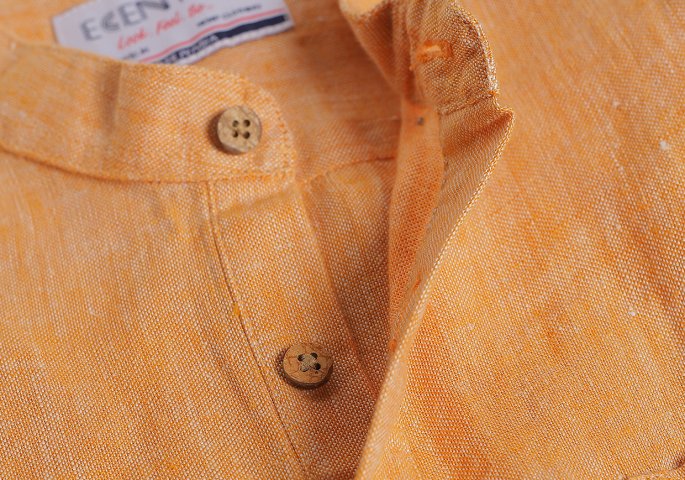
Men Herringbone White Slim Fit Hemp Shirt
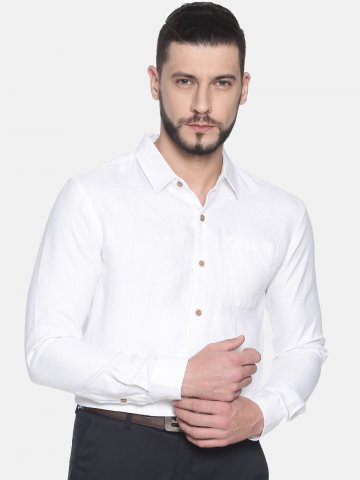
There is nothing more universally formal than a white full sleeve shirt. This smart white formal shirt sports a herringbone weave design and is constructed completely from hemp. It keeps you cool in the summers and warm in the winters and is extremely light-weight and comfortable. Moreover, it protects you from the harmful UV rays and keeps sweat odours at bay. Available in small, medium, large and extra large sizes, it is priced between ₹ 1,699.00 - ₹ 1,999.00. You can buy this exquisite formal shirt here.
Women Blue Solid Hemp Straight Long Kurta
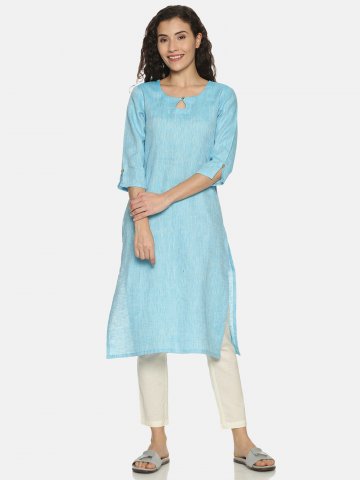
This is a beautiful long kurta constructed completely of hemp in a cheerful sky blue colour which you can wear comfortably all day long and in any season - be it winter or summer. The straight kurta features 3/4 sleeves and comes in small, medium, large and extra large sizes. It is machine washable and has amazing colour fastness. You can buy this elegant and eco-friendly kurta here for ₹ 1,399.00 - ₹ 1,699.00
Men Light Brown Hemp Solid Lounge Pant
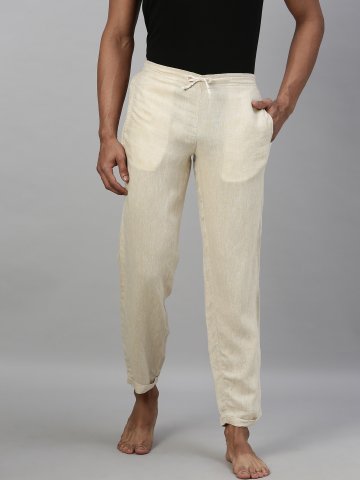
This pant is for the days you want to lounge and relax all day long. They are super-comfortable, breathable and highly absorbent keeping you chilled out in all seasons. It goes well with a casual T-shirt or a kurta to complete your casual look. It is constructed from 100% hemp and is available in 4 sizes here for ₹ 1,199.00.
Where Can You Find Them?
ecentric.inQ & A with Ecentric's Founder (Contd.)
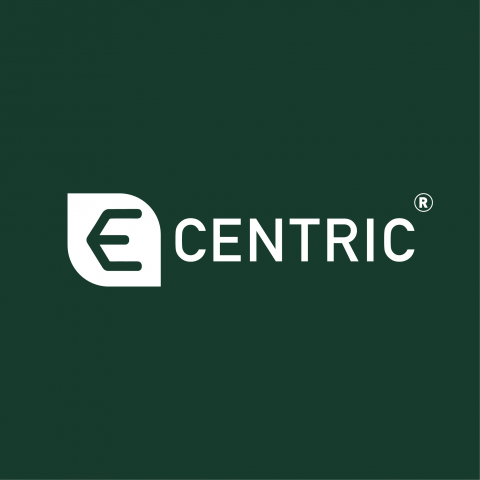
- Q. Tell us about hemp and how as a fabric it is suited to the Indian climate?
- The usage of hemp in the day-to-day life of ancient civilizations was substantial. Hemp was used for a wide variety of applications and even today, hemp’s versatility and durability makes it a fibre which would be an ideal candidate for use in multiple products such as apparel, accessories, footwear, furniture and home furnishings. Hemp is known for its strength and durability. It is also very comfortable. The more you wear a hemp-based garment the softer it will become. Hemp enthusiasts like to say, “Hemp doesn’t wear out, it wears in.” Due to its inherent chemical structure, hemp is resistant to moths and UV light. It has a super-absorbent nature and as moisture is released into the air, the cloth will remain cool and dry. This quick-drying structure hinders the growth of anaerobic bacteria, giving hemp antimicrobial and hypoallergenic properties. The fibre’s structure allows it to be naturally climate responsive. It keeps the wearer cool in very warm conditions and warm in cooler temperatures. Hemp’s absorbency and its ability to protect against UV rays make a garment that is less prone to fading and offers sun protection. Given the humid climate of India, hemp can be an ideal fabric going forward given its properties.
- Q. What are some common misconceptions around the use of hemp?
- Hemp, more commonly called marijuana is known to us as a recreational/medicinal drug. It is in fact one of nature’s best gift to mankind but has not been explored fully. Industrial hemp and marijuana are different varieties of the same plant. Tetrahydrocannabinol (THC) is the component which causes psychoactive effects. Marijuana has higher THC and is derived from the Indica family of the hemp plant. Grown from the Sativa plant, industrial hemp is used for a wide variety of cases. Industrial hemp fibre is a type of “bast fibre” like other natural fibres derived from the stalk of plants such as flax and jute. It has been cultivated for thousands of years and on almost every continent. It is also one of nature’s most sustainable fibres and can be used in the textile industry.
- Q. What are you trying to achieve?
- We are trying to make sustainable clothing affordable for the masses so that more and more people can try sustainable fashion like hemp clothing. Hence, we can all contribute to environment change and create a better future together.
- Q. What makes Ecentric different from other sustainable fashion brands?
- All our products are made from 100% hemp and hemp blend fabric which is the most sustainable plant and we also use only eco-friendly packaging. The limited number of sustainable fashion brands and the price range makes adoption of sustainable fashion difficult at large scale in India. With our affordable sustainable fashion offering we aim to bridge that gap and fast track the adoption. Normally, if someone wants to buy a good linen shirt it would cost them upwards of ₹ 2,000.00 and we have our shirts starting from ₹ 1,499.00 which are made from hemp.
- Q. What are your own interests? How did you spend time during the lockdown?
- I love playing chess and was fortunate enough to participate in the national team championship in 2010. Apart from chess, I like watching movies and discussing new business ideas with my friends.
Future Plans?
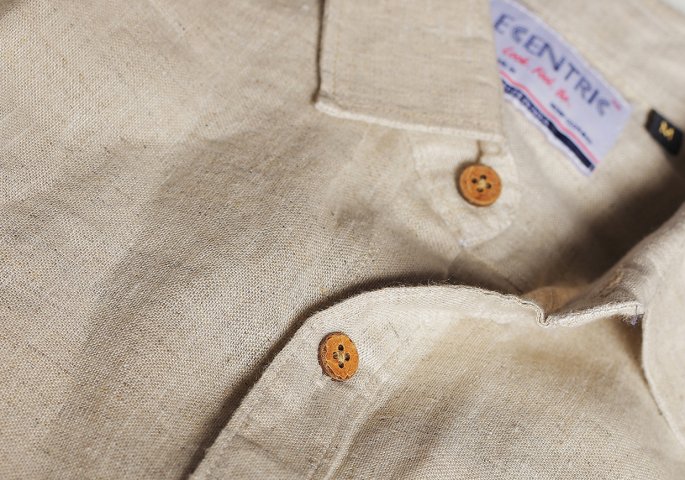
We are getting a lot of love from our customers. We always try to build something which our customers would like to try or want us to make and that is how we launched dresses for women. There are many customers who want us to try T-shirts (knitwear). We are planning to launch T-shirts very soon.
Any Recommendations for Us?
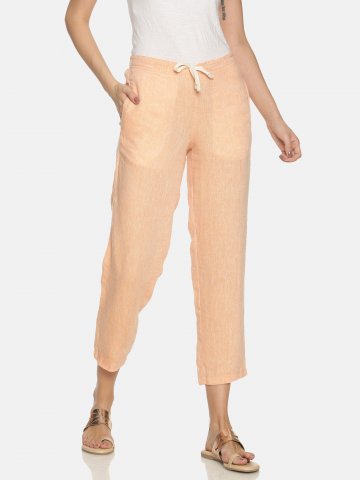
In the men’s category we are seeing good demand for shirts and lounge pants. For women, lounge wear and kurtas have good traction.
-
 A Guide to How to Dress for Business Casual Men and 10 Business Casual Men Outfits and Accessories That Will Help You to Give a Professional and Businesslike Impression (2020)
A Guide to How to Dress for Business Casual Men and 10 Business Casual Men Outfits and Accessories That Will Help You to Give a Professional and Businesslike Impression (2020)
-
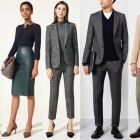 Confused about Dressing up Casual for Office? Don't Worry, Here are 5 Business Casual Dress Code and Top Tips to Help You Choose Appropriately Casual Attire for the Workplace (2020)
Confused about Dressing up Casual for Office? Don't Worry, Here are 5 Business Casual Dress Code and Top Tips to Help You Choose Appropriately Casual Attire for the Workplace (2020)
-
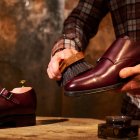 Luxe Shoes Aren't Only About Dropping a Load of Cash, It's the Comfort, Class and Service These Brands Provide: 10 Luxury Brand Shoes for Men and Women (2020)
Luxe Shoes Aren't Only About Dropping a Load of Cash, It's the Comfort, Class and Service These Brands Provide: 10 Luxury Brand Shoes for Men and Women (2020)
-
 Ready to Discover How to Dress up Smart Casual with Style? Here are 10 Best Business Casual Men Summer Wear to Instantly Upgrade Your Style (2020)
Ready to Discover How to Dress up Smart Casual with Style? Here are 10 Best Business Casual Men Summer Wear to Instantly Upgrade Your Style (2020)
-
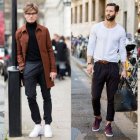 It's Time to Ditch the Boring Office Wear You Don Like a Uniform Each Morning! Try on the Latest in Men's Casual Office Wear 2021
It's Time to Ditch the Boring Office Wear You Don Like a Uniform Each Morning! Try on the Latest in Men's Casual Office Wear 2021
Being more responsible consumers
Change comes about in small ways, through everyday actions. If we truly wish to see a better world for ourselves and for future generations to come, then a greater awareness about what we consume and where it comes from is the need of the hour. The fashion industry is one of the world's biggest polluters and will continue to be unless as consumers we demand better.

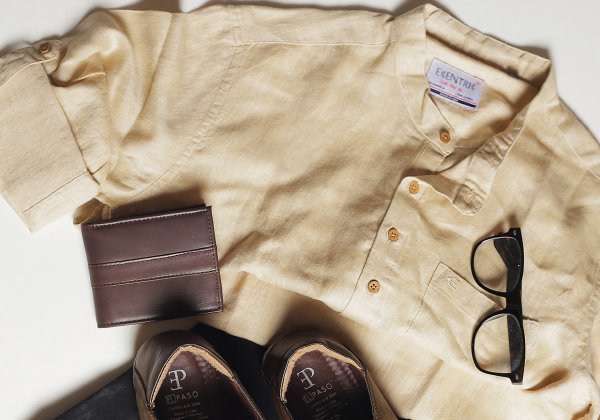
 Highlight the Best Facets of Your Incomparable Beauty: Discover the Best Face Highlighter Currently Available in India and Everything You Need to Know About Using Face Highlighters for Maximum Effect (2023)
Highlight the Best Facets of Your Incomparable Beauty: Discover the Best Face Highlighter Currently Available in India and Everything You Need to Know About Using Face Highlighters for Maximum Effect (2023)
 Forget the Blemishes and Get that Picture Perfect Flawless Radiance on Your Face: Check out the Best Foundations for Oily Skin Currently Available in India and Everything You Need to Know About Makeup Foundations (2023)
Forget the Blemishes and Get that Picture Perfect Flawless Radiance on Your Face: Check out the Best Foundations for Oily Skin Currently Available in India and Everything You Need to Know About Makeup Foundations (2023)
 Make Your Presence Felt Wherever You Go: Discover the Best Perfumes Under 2000 for Both Men and Women to Announce Your Arrival and Make Any Occasion Memorable (2023)
Make Your Presence Felt Wherever You Go: Discover the Best Perfumes Under 2000 for Both Men and Women to Announce Your Arrival and Make Any Occasion Memorable (2023)
 Protect Your Oily Skin from the Harmful Rays of the Sun: Discover the Best Gel Based Sunscreens for Oily Skin and Everything You Need to Know Before Buying One (2023)
Protect Your Oily Skin from the Harmful Rays of the Sun: Discover the Best Gel Based Sunscreens for Oily Skin and Everything You Need to Know Before Buying One (2023)
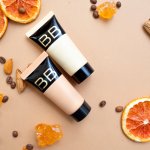 Minor Blemishes and Wrinkles Affecting Your Confidence? Check out the Best BB Creams to Conceal Your Worries and Nourish Your Skin to Restore the Healthy, Radiant and Glowing Complexion Back Again (2023)
Minor Blemishes and Wrinkles Affecting Your Confidence? Check out the Best BB Creams to Conceal Your Worries and Nourish Your Skin to Restore the Healthy, Radiant and Glowing Complexion Back Again (2023)
